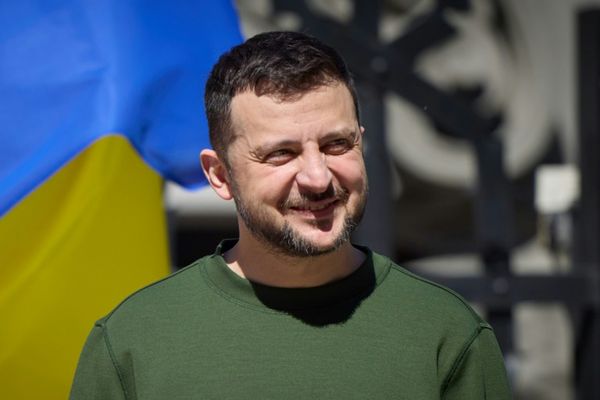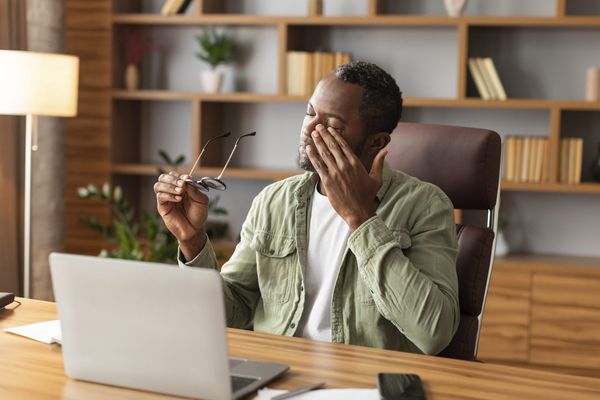For many Australians now living with Omicron, "COVID zero" is a distant memory.
But not for the Myers family.
They're trying to remain a "COVID zero household" by shutting themselves off from the outside world and living in a bubble.
Despite two sons with "high needs", Fiona and David Myers stopped support workers coming into their Sydney home in an effort to keep them safe from the current Omicron wave.
Normally, there would be up to four support workers in the house everyday but the family has decided their only option at this time is to be on their own.
"Trying to manage both the boys' needs has been tricky," Ms Myers said. "We're torn as well because it's not sustainable for a long period of time."
Ms Myers's four-year-old son Korbyn lives with an undiagnosed genetic syndrome that causes complex disabilities.
Vision impaired and predominantly peg or tube fed, Korbyn requires assistance with "every bit of his daily living."
Ms Myers's 10-year-old son Hayden is autistic and requires one-on-one support "pretty much all the hours that he's awake."
On the advice of a paediatrician, Hayden and his 11-year-old sister Charlotte have not gone back to school this year to try and avoid bringing COVID back to Korbyn.
"That's the reality for us, if Korbyn were exposed at this point in time with no protection."
Ms Myers lives with myalgic encephalomyelitis or chronic fatigue syndrome and her husband has three autoimmune conditions.
The couple is triple vaccinated and their older children have had one dose and are waiting on their second. Korbyn will be vaccinated once he turns five in June.
Mr Myers operates his business from home and their support workers were helping in "creative" ways like running errands, grocery shopping and food preparation for Korbyn.
But despite the help, she said they felt "completely ignored" by governments and there needed to be more public education about ways to reduce community transmission to protect people like her family.
"The disabled community don't get a choice in all this [it's] a genetic lottery" she said.
'They're at risk of dying'
Professor Anne Kavanagh from the University of Melbourne's Centre for Research Excellence in Disability and Health said the current situation for the sector was "distressing."
She said there was no data about the measures people with disability and their families were taking to protect themselves.
"We know anecdotally that there are lots of people who've missed out on care because of a shortage in the disability workforce, because their workers have either had to isolate or because they've been COVID positive."
There were at least 180,000 workers in the aged and disability sectors before the pandemic, according to government statistics.
"Some people rely literally on people to help get them out of bed, to feed them, to shower them," Professor Kavanagh said.
"If they're not getting those essential supports, they're actually at risk of dying from non-COVID related causes."
Nearly two years into the pandemic, Professor Kavanagh said there were still no plans for a surge disability support workforce that could fill in gaps when needed.
Rapid COVID tests are still in short supply for disability support workers. And high quality N95 masks are still not mandatory for home visits.
According to Professor Kavanagh, the situation is so dire possibly infectious support workers are still making home visits.
"Because of the issues around workforce shortages, there are exemptions for disability workers to go into people's homes if they're close contacts," Professor Kavanagh said.
"So the very group of people we're trying to protect are put at risk because we've had to bring back a workforce that we previously kept in isolation."
Surge workforce not required: government
In a statement, National Disability Insurance Scheme (NDIS) Minister Linda Reynolds said she had "nothing but praise and great admiration" for the way the sector continued to work "together and with the government on workforce continuity, infection control and vaccinations."
"In December 2021, the National Disability Insurance Agency engaged [independent disability support service] genU to provide workforce support services to disability service providers in all states and territories," she said.
"Since the commencement of the genU contract, genU have resolved all referrals [and] requests they have received," the statement said.
Ms Reynolds said participants could purchase RATs using their NDIS plans to "meet their support needs."
"I recommend that all NDIS participants who require additional support or plan funding as a result of the current outbreak contact the NDIS to discuss their specific needs."
Support a 'link to the world'
In Perth, Natasha Platcher is worried about the impact the lack of support has had on her disability.
The 47-year-old lives with MS and relies on disability support workers six days a week.
"They're my right hand men, basically [they're] definitely my everything, and my link to the world," she said.
Ms Platcher's three grown children all work and her husband also lives with a disability. When lockdowns came to Western Australia, her daily support stopped almost immediately.
"If I get stressed, my symptoms increase, my stuttering increases, my spasms increase... I can't do simple things, and everything's so painful."
Western Australia is still behind a hard border and is the one Australian jurisdiction yet to "open up".
It is in the middle of a small Omicron wave, but Premier Mark McGowan has so far not given a date on when it will bring down its border and effectively let COVID in.
Though Ms Platcher agrees that endless lockdowns aren't sustainable, she wished opening up came with a plan to safely maintain home support for people with a disability.
"People just thought we were being looked after, but we weren't," she said.
"There was no ideas of, how can we make this work for these people?"







